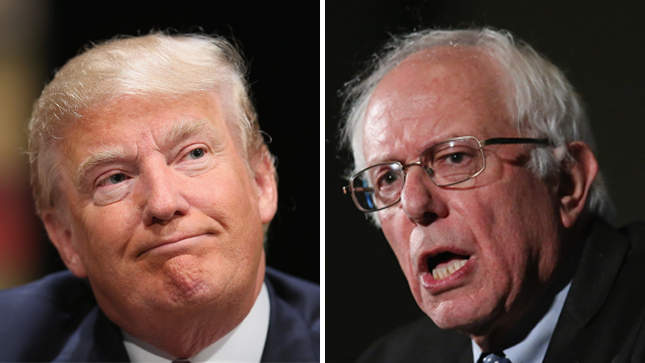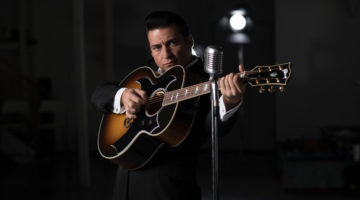Trump, Sanders Deflate Super PACS In Unpredictable 2016 Race
By Associate Press
MIAMI (AP) — Four years ago in Florida, a super PAC pummeled Republican presidential hopeful Newt Gingrich with $10 million in attack ads, clearing him out of the race to the benefit of eventual nominee Mitt Romney.
Once again attack ads are raining down in the Sunshine State, this time some $18 million worth against Donald Trump, as outside groups try to edge the front-runner off the path to the nomination.
But like so many other aspects of 2016, super PACs aren’t working out as planned.
Outside groups so far have spent roughly $300 million on the presidential race, an Associated Press analysis found. For all of that money, Trump, who has dismissed super PACs as a “crooked business,” is leading the Republican field.
And on the Democratic side, Bernie Sanders deflects the big-money spending of front-runner Hillary Clinton’s allies by using their mere presence as a fundraising opportunity. That could help explain why Priorities USA, a super PAC backing Clinton, has spent just $6 million of its $50 million.
“People are kind of on to them,” Ben Carson, who recently dropped out of the Republican presidential race and now backs Trump, said of outside groups. “There’s so much at stake that people don’t have a lot of time to pay attention to silly ads, and that’s essentially what these super PACs do. They haven’t found anything useful to do.”
For the early voting states, well-funded advertising campaigns to take down Trump didn’t exist. That changed with Florida: The airwaves here are awash in Trump-bashing ads.
One of the hardest-hitting spots calls the billionaire businessman “offensive, out of control,” as it plays bleeped-out clips of him using harsh language. Another tells Republican voters that Trump is “very liberal” and is “playing us for chumps.”
Still more ads ridicule Trump’s for-profit university, his real estate company’s use of foreign workers and his delay in condemning the endorsement of a former Ku Klux Klan leader.
Like so many arguments against Trump’s candidacy, the messages don’t seem to resonate.
Recent polls show Trump well ahead of home-state senator Marco Rubio in Florida, one of five states holding presidential primaries on Tuesday. Indeed, the group spending the most to take out Trump in Florida is Rubio’s super PAC, Conservative Solutions.
Across the country, Rubio has benefited from $64 million in spending by Conservative Solutions and a companion nonprofit that doesn’t disclose its donors. He’s won just three of 27 primary contests.
Rubio’s failure to launch follows that of fellow Republican presidential candidates Jeb Bush, Scott Walker and Rick Perry, who also couldn’t leverage millions of dollars in super PAC help. Carly Fiorina ran her entire presidential bid on the back of a $12 million super PAC, but she, too, sputtered out.
Such efforts account for the bulk of the nearly $300 million in outside spending that the AP tallied by reviewing Federal Election Commission reports and ad buys tracked by Kantar Media’s Campaign Media Analysis Group.
That’s with almost eight months to go. In the entire 2008 election, outside groups spent less than $40 million on federal politics.
The cash tsunami followed the 2010 Supreme Court ruling on Citizens United, which made clear that spending on elections has free speech protections. That means that while the candidates’ official campaigns are limited to donations of $2,700 per election, individuals, corporations and unions can form outside groups to spend big on races.
Presidential super PACs debuted in the 2012 GOP primary. In addition to hammering Gingrich, the pro-Romney group, called Restore Our Future, spent millions of dollars crushing Rick Santorum.
“We played a very vital role in that we litigated the records of Newt Gingrich and Rick Santorum,” said Carl Forti, who ran Restore Our Future.
That’s exactly what groups are trying to do now with Trump. The difference, Forti said, is that the ads cannot match the “overwhelming” amount of news coverage that Trump has attracted.
An earlier advertising effort to define Trump and Sanders could have worked, said Anthony Corrado, a professor at Colby College in Maine, who specializes in the influence of money in politics. But at this point, doing so plays right into an outsider’s hands, Corrado said.
“For both of them, a rising tide of money against them only reinforces their image as the guys that the Washington insiders are worried about.”
The Sanders campaign seems well aware of that.
“Just yesterday, the Clinton campaign’s largest super PAC announced hundreds of thousands of dollars in new spending in Missouri, Illinois and Ohio. And there’s more coming,” his campaign manager Jeff Weaver wrote.
He concluded by asking for $3.
[livemarket market_name="KONK Life LiveMarket" limit=3 category=“” show_signup=0 show_more=0]




No Comment